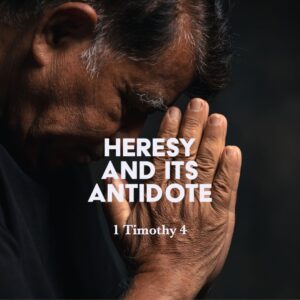1 Timothy 4: Heresy and Its Antidote
August 6, 2023
TODAY'S BIBLE READING:
Ezra 8, Proverbs 6, Luke 14:25-35, 1 Timothy 4

In this passage, Paul teaches Timothy – and us – what the nature of false teaching is and what is to be done about it.
First, according to Paul, false teaching will occur in the last days. That is, in the time between Jesus’ first coming and his second coming (that time in which we now live), there will be an expansion of false teaching. History has proven Paul’s prediction correct, and there is an ever-growing body of false teaching in our world still today.
Paul makes no bones about what motivates the false teachers: they are hypocritical liars whose consciences have been seared as with a hot iron. These are not people who make well-meaning mistakes; everyone can be mistaken sometimes, and when that mistake is made clear, we are to change our opinions to bring them into line with the Bible. What concerns Paul are those whose consciences are not liable to be corrected because they have been seared as with a hot iron and are not soft and liable to correction. Such people are lying and pretending; they are hypocritical liars.
Paul also describes the essence of the message that false teachers give. There can be many different kinds of false teaching, but always in essence, it takes us away from the freedom that we have in Christ to various kinds of legalistic bondage. They forbid people to marry; they order them to abstain from certain foods. They set up rules and legislations by which they can control people and manipulate people according to their own human principles. But, instead, we know that everything that God created is good and is to be received with thanksgiving as it is consecrated by the Word and prayer.
So much for the false teachers and for their teaching. What is to be done about it?
First, Timothy is to point out false teaching. Part of the role of a teacher of the Bible is to warn people against whatever form the false teaching is taking in their own day.
Second, Timothy is to train himself to be godly. If he is to be warning people against legalism, he must be a living example of the kind of godly training that is an expression of the gospel of grace. This is something more important than physical training – which Paul admits has some value (there is no excuse to neglect our physical health) — because godliness has value not only for this life but for eternity to come.
Third, Timothy is to teach with authority. He is to command and teach these things. He is not to let anyone look down on him for his youth. People will always want to find a way to sneer and demean teachers of the Bible. But those who teach the Bible are to teach with the authority of God.
Fourth, Timothy is to act with deliberate focus upon the teaching of the Bible. There are many tasks and responsibilities that he has, no doubt. But he is to devote himself to the public reading and interpretation of the Scriptures. This text is one of the reasons why, when possible, I prefer not only to teach the Bible that I am preaching from but also to read it too.
Fifth, Timothy is make sure that he is constantly growing and improving as a teacher. No one has reached perfection at any point in this life, and if we are not growing, we are standing still. Even preachers are to set an example as learners – for if we are not learners, how can we possibly be teachers?
Sixth, Timothy is to set a careful guard over himself. As a preacher and teacher, he is especially liable to be set on a pedestal, and as such, therefore, he is to be especially careful to watch over himself. And this in two categories: he is to watch his life and his doctrine, how he acts as well as how he teaches. It is possible to live well and preach badly; it is also possible to preach well and yet live badly. Either way is the path of spiritual shipwreck, not just for the teacher whose soul is in danger either from hypocrisy or heresy, but also for those who listen to him whose faith may well be shaken by his failure. Those who watch over others must watch over themselves too!
ABOUT THE AUTHOR
Josh Moody (Ph.D., University of Cambridge) is the senior pastor of College Church in Wheaton, IL., president and founder of God Centered Life Ministries, and author of several books including How the Bible Can Change Your Life and John 1-12 For You.
WANT MORE?
To receive God Centered Life devotionals directly in your inbox, as well as other resources, enter your email address in the form at the bottom of this page and click "subscribe."

